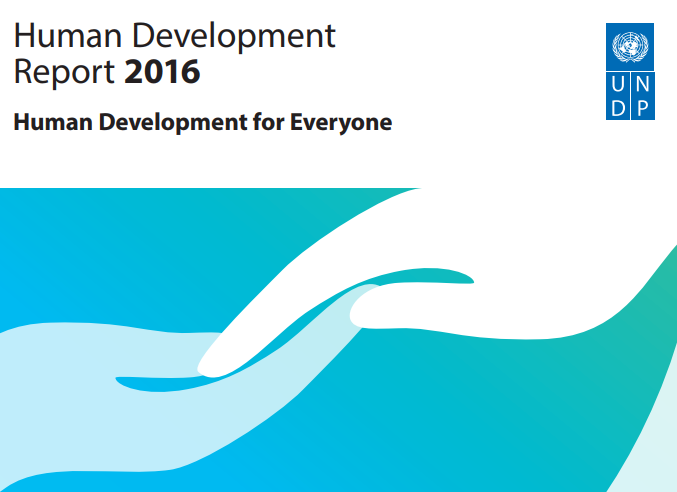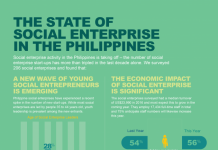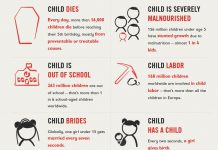Human development has made much progress in the last 25 years – poverty is declining, more people live longer, fewer children are dying overall, more people are connected through technology, digital and social – yet new challenges have emerged.
Worldwide, one person in nine is hungry, one in three malnourished. About 15 million girls a year or one every two seconds marry before age 18. 18,000 people a day die because of air pollution. Every minute, 24 people on average are displaced from their home. Every minute, 4 people on average continue to get infected with HIV.
Issues like climate change, religious extremism, epidemics and persistent geopolitical issues are the main drivers. Many have been left out, or have been deprived of social and economic rights. Many are desperate to migrate to other countries, are refugees even in their own countries, or are dying everyday due to violent conflicts, disease or pollution.
Why This Matters
Human development is all about increasing progress, mobility and freedom so humans are free to choose what they value and maximize their well-being.
Impact investment can be a tool to channel investments that affirm those rights.
Available data and recent trends suggest that impact investment favor selling services and products that benefit human development or target certain population segments, like women.
Women’s Rights
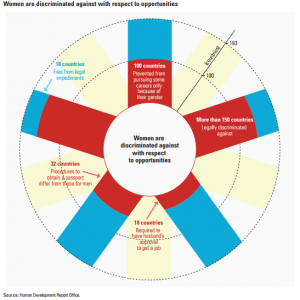
The UN Report specifically highlighted that women in many areas continue to be deprived of social and economic freedoms to help households get relief from poverty. Deprivations facing such women are the most extreme barrier to global progress in human development.
There are 18 countries today where husbands can deny their wives the right to work, and another 100 countries where women are prevented from pursuing careers only because of their gender.
Problem-Defining Before Prescribing
The report recognizes that sustainable development is an issue of social justice. In many economies – true even in more developed countries like the U.S. – there is bias of policy options towards those with affluence and have structured legal systems and institutions in a way that preserves the power of the wealthy.
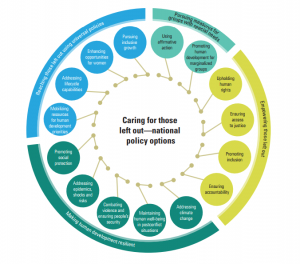
Sustainable development is also an issue of human security. Deeper understanding of threats, risks and crises from violent extremism or climate change is needed to balance the shock-driven response to threats in communities globally, and the promotion of a culture of prevention.
Sustainable development is also an issue of ability to participate in public debates, and create agency structures to represent the voices of the unheard or the deprived. Past efforts have been well-intentioned work to improve well-being, but more is needed to improve freedom of individual and collective agency.
Finally and perhaps most importantly, sustainable development is also an issue of identity. Humans deserve options to choose among different identities that they value. Insistence of a single “national” identity in many geopolitical states leads to extremism and pose a threat to human development. Minority identity groups, already disadvantaged, compete for limited economic and political resources and get left out. Policies informed by society’s past norms or social traditions often deny the freedom to choose the identities they value. These types of biases exist today in many economies, in small rural communities or in inner cities even in developed nations like the U.S.
Progress Remains Possible
The report holds out hope that progress in human development is achievable. The world has the resources, the technology, enough human ingenuity and the expertise to continue.
The Internet, absent half a century ago, now brings people together online or offline, virally in many cases over new social platforms invented just a decade ago. Mobile devices like smartphones magnify this ability, and can reach humans even in lesser developed regions like in East Africa or India. Innovation labs and venture capital in well known regions like Silicon Valley are hard at work developing the next miracle drug or technology enabler like Artificial Intelligence.
Crowdfunding, absent too just a decade ago now allows individuals to contribute small amounts of money towards philanthropic causes or projects that in many cases require larger funding.
Newer philanthropic innovations are occurring, blending traditionally philanthropic approaches with conventional investing and creating new impact investing vehicles like social impact bonds, and the Rise Fund.
Social taboos are also receiving increased attention and debate. Civil society and policymakers recognize this trend. Same-sex marriage is performed in nearly 24 countries today. LGBTQ have equal constitutional rights in 5 countries; while a small number, their rights are at least discussed in the United Nations. Norms, values and legal frameworks are evolving to empower more women.
Finally, awareness of sustainability has increased. Climate change is more visible. Responsible ways to operate businesses in a way that reduces harm to the environment or natural resources have increased. In some economies, government has subsidized or supported clean energy which have benefited business like Tesla.
Realization is growing that natural resources are everybody’s responsibility, from individuals to global institutions. Evidenced by agreements like the Paris Accord in 2016 and the UN 17 SDG goals, global consensus is emerging to ensure a sustainable world for future generations.
***
Key Messages
This Report conveys five basic messages:
- Universalism is key to human development, and human development for everyone is attainable.
- Various groups of people still suffer from basic deprivations and face substantial barriers to overcoming them. Human development for everyone calls for refocusing some analytical issues and assessment perspectives.
- Policy options exist and, if implemented, would contribute to achieving human development for everyone.
- A reformed global governance, with fairer multilateralism, would help attain human development for everyone.
***
Source: UNDP

